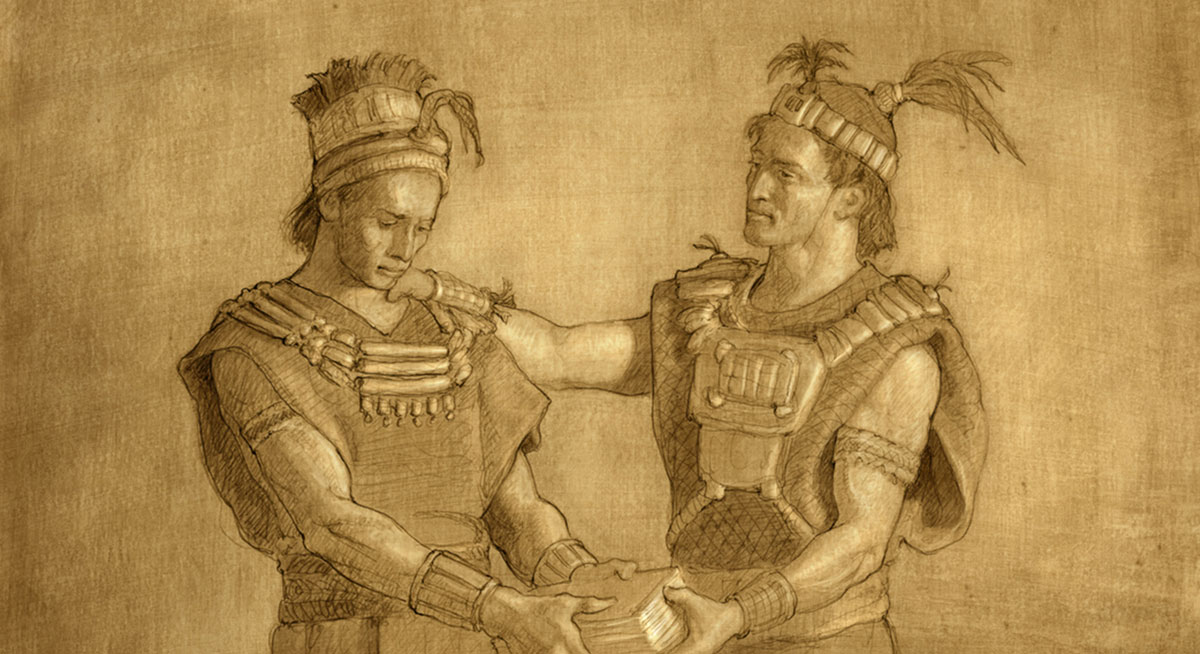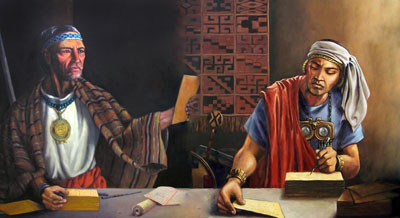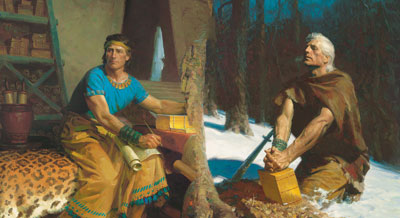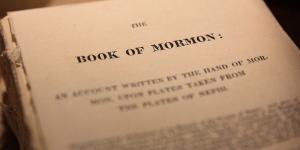You are here
Why Do So Many of Mormon’s Teachings Appear in Ether 4 and 5?

Ether 4:19
The Know
Ether 4 and 5 present Moroni’s conclusion to the awe-inspiring account of the Brother of Jared’s vision of the premortal Christ. Moroni had a number of editorial comments to make to future Gentile readers of this account, including how they could prepare themselves to receive all that the Lord had revealed to the Brother of Jared. He wanted them to understand how they could come to believe in his words —and in the words of Christ—as well as what they needed to do in order to receive the blessings that were promised to believers.
As he made these comments in Ether 4–5, Moroni repeated and made use of many of the themes and verbal expressions used by his father, Mormon. For example, Moroni wrote in Ether 4:11–12 that by the “Spirit he shall know that these things are true; for it persuadeth men to do good.”1 In Moroni 7, Mormon similarly had stated, “For behold, the Spirit of Christ is given to every man, that he may know good from evil; wherefore, I show unto you the way to judge; for every thing which inviteth to do good, and to persuade to believe in Christ, is sent forth by the power and gift of Christ” (Moroni 7:16).
Furthermore, towards the end of his writings, Moroni again rehearsed these same principles: “And whatsoever thing is good is just and true; wherefore, nothing that is good denieth the Christ, but acknowledgeth that he is” (Moroni 10:6).
The following chart illustrates several of the many intertextual2 uses in Moroni’s writings in Ether 4–5 and Moroni 10 of distinctive words and doctrinal themes previously written by Mormon in Moroni 7:
| Parallel Element | Moroni 7 (Mormon) | Ether 4–5 (Moroni) | Moroni 10 (Moroni) |
|---|---|---|---|
| Addressed to specific audience | To the church, the peaceable followers of Christ (7:3) | To the Gentiles (4:6, 13) | To the Lamanites (10:1) |
| Must have faith, hope, and/or charity to be part of church/kingdom | … that have obtained a sufficient hope by which ye can enter into the rest of the Lord … until ye shall rest with him in heaven” (7:3) “for if ye have not faith in him then ye are not fit to be numbered among the people of his church (7:39) |
… blessed is he that is found faithful unto my name at the last day, for he shall be lifted up to dwell in the kingdom … (4:19) | And except ye have charity ye can in nowise be saved in the kingdom of God; neither can ye be saved in the kingdom of God if ye have not faith; neither can ye if ye have no hope (10:21) |
| Discerning good from evil; all that is good (every good gift) comes from God; anything that is good invites to come to Christ and not deny Him; good people work by the “power and gift(s)” of Christ/God | Wherefore, a man being evil cannot do that which is good; neither will he give a good gift. Wherefore, all things which are good cometh of God; and that which is evil cometh of the devil; For behold, the Spirit of Christ is given to every man, that he may know good from evil; wherefore, I show unto you the way to judge; for every thing which inviteth to do good, and to persuade to believe in Christ, is sent forth by the power and gift of Christ; wherefore ye may know with a perfect knowledge it is of God. But whatsoever thing persuadeth men to do evil, and believe not in Christ, and deny him, and serve not God, then ye may know with a perfect knowledge it is of the devil … Wherefore, I beseech of you, brethren, that ye should search diligently in the light of Christ that ye may know good from evil; (7:5–19) |
For because of my Spirit he shall know that these things are true; for it persuadeth men to do good. And whatsoever thing persuadeth men to do good is of me; for good cometh of none save it be of me. I am the same that leadeth men to all good (4:11–12) |
And whatsoever thing is good is just and true; wherefore, nothing that is good denieth the Christ, but acknowledgeth that he is. And I would exhort you, my beloved brethren, that ye remember that every good gift cometh of Christ. And wo be unto the children of men if this be the case; for there shall be none that doeth good among you, no not one. For if there be one among you that doeth good, he shall work by the power and gifts of God. (10:6, 18, 25) |
| Pray unto Father with “heart” | … pray unto the Father with all the energy of heart … (7:48) | … yea, when ye shall call upon the Father in my name, with a broken heart and a contrite spirit … (4:15) | … ask God, the Eternal Father, in the name of Christ … ye shall ask with a sincere heart, with real intent … (10:4) |
| By the Spirit, one can know the truth | … the way to judge is as plain, that ye may know with a perfect knowledge … For behold, the Spirit of Christ is given to every man, that he may know good from evil (7:15–16) |
For because of my Spirit he shall know that these things are true … (4:11) | … he will manifest the truth of it unto you, by the power of the Holy Ghost. And by the power of the Holy Ghost ye may know the truth of all things (10:4–5) |
| God will provide witnesses | Wherefore, by the ministering of angels, and by every word which proceeded forth out of the mouth of God, men began to exercise faith in Christ; For behold, [the angels] are subject unto [Christ], to minister according to the word of his command, showing themselves unto them of strong faith and a firm mind in every form of godliness. And the office of their ministry is to call men unto repentance … to prepare the way among the children of men, by declaring the word of Christ unto the chosen vessels of the Lord, that they may bear testimony of him. (7:25, 29–31) |
And unto three shall [the plates] be shown by the power of God; wherefore they shall know of a surety that these things are true. And in the mouth of three witnesses shall these things be established; and the testimony of three, and this work, in the which shall be shown forth the power of God and also his word, of which the Father, and the Son, and the Holy Ghost bear record—and all this shall stand as a testimony against the world at the last day. (5:3–4) |
And I exhort you to remember these things; for the time speedily cometh that ye shall know that I lie not, for ye shall see me at the bar of God; and the Lord God will say unto you: Did I not declare my words unto you, which were written by this man, like as one crying from the dead, yea, even as one speaking out of the dust? And God shall show unto you, that that which I have written is true. (10:28–29) |
| The problem of unbelief | But whatsoever thing persuadeth men to do evil, and believe not in Christ, and deny him, and serve not God, then ye may know with a perfect knowledge it is of the devil (7:17) | And now, after that, they have all dwindled in unbelief … the knowledge which is hid up because of unbelief. … and it hath not come unto you, because of unbelief. Behold, when ye shall rend that veil of unbelief which doth cause you to remain in your awful state of wickedness, and hardness of heart, and blindness of mind … (4:3, 13–15) |
… all these gifts of which I have spoken, which are spiritual, never will be done away, even as long as the world shall stand, only according to the unbelief of the children of men. if the day cometh that the power and gifts of God shall be done away among you, it shall be because of unbelief. (10:19, 24) |
The Why
The material presented in this KnoWhy provides an extensive example of intertextuality between two Book of Mormon writers. It is, perhaps, natural to expect that Moroni would know and use the words of his father, the great prophet-redactor-historian, Mormon. BYU professor of law, W. Cole Durham, Jr., commented on the relationship between the two:
The scriptures provide only a limited account of Moroni’s family relationships and focus solely on father and son, but the glimpses suggest a tie rich with natural affection, strengthened by mutual concern for the ministry.3
Durham noted how these ties affected the content and style of Moroni’s writing:
The very structure of Moroni’s writings reflects a profound respect for his father. His initial writings (Morm. 8 and Morm. 9) were intended to do no more than complete his father’s record. Later, when Moroni added his own book, approximately two-thirds of its space was devoted to a presentation of his father’s teachings and letters.4
Moroni chose to emphasize several of his father’s important teachings, including the central themes of faith, hope, and charity, and the need to come unto Christ. As Professor Durham noted, “These themes are prevalent both in the writings of Mormon which Moroni quotes and also throughout Moroni’s portion of the Book of Mormon.”5
Just as Moroni shared with future readers these teachings of Christ that his father had emphasized, he also passed these principles on in his role as mentor to Joseph Smith. As the prophet’s mother recorded, at the time Joseph beheld the plates, “the angel showed him, by contrast, the difference between good and evil, and likewise the consequences of both obedience and disobedience to the commandments of God, in such a striking manner, that the impression was always vivid in his memory until the very end of his days.”6
Further Reading
Book of Mormon Central, “Why Does Nephi Quote a Temple Psalm while Commenting on Isaiah? (2 Nephi 25:16),” KnoWhy 51 (March 10, 2016).
Book of Mormon Central, “Why Does Jacob Quote So Much from the Psalms? (Jacob 1:7; cf. Psalm 95:8),” KnoWhy 62 (March 25, 2016).
W. Cole Durham, Jr., “Moroni,” Ensign, June 1978.
- 1. Moroni presents these words as a quotation from memory of the things Jesus Christ commanded him to write (Ether 5:1). Because the section quoted here is very similar to what Mormon wrote in his letter transcribed in Moroni 7, readers may speculate that either Moroni received a revelation from Christ that had previously been given (at least partially) to his father, that the revelation had originally been given to Mormon and Moroni simply took upon himself the instructions that Christ had given to his father, or that both Mormon and Moroni had been given similar teachings in the revelations that each had received. See also John Gee, “Quotations of the Sealed Portions of the Book of Mormon,” Insights 24, no. 6 (2004): 2–3.
- 2. See Book of Mormon Central, “Whom Did Nephi Quote in 1 Nephi 22? (1 Nephi 22:1),” KnoWhy 25 (February 3, 2016). Regarding Nephi’s intertextual use of biblical passages, it states: “Far from slavishly and lazily copying the Bible, Book of Mormon authors, such as Nephi, conscientiously knit together strings of biblical phrases and passages in an intricate manner that expanded and re-conceptualized the teachings of biblical prophets. This phenomenon of a text recombining quotations, allusions, and paraphrases of other texts for new literary purposes is called intertextuality. It was anciently the mark of a fine scribe or author and is found explicitly and implicitly throughout the biblical books themselves.” See also Book of Mormon Central, “Why Does Nephi Quote a Temple Psalm while Commenting on Isaiah? (2 Nephi 25:16),” KnoWhy 51 (March 10, 2016); “Why Does Jacob Quote So Much from the Psalms? (Jacob 1:7; cf. Psalm 95:8),” KnoWhy 62 (March 25, 2016); “Why Do Certain ‘Treasured Words’ Appear So Repeatedly in General Conference Talks? (2 Nephi 25:26),” KnoWhy 69 (April 2, 2016); “Why Did Ammon Borrow So Much from Tradition in Alma 26? (Alma 26:8),” KnoWhy 133 (June 30, 2016).
- 3. W. Cole Durham, Jr., “Moroni,” Ensign, June 1978.
- 4. Durham, “Moroni.”
- 5. Durham, “Moroni.” See, Mormon 9:27–29; Ether 4:7, 11–19; Ether 12:23–41; Moroni 7; Moroni 10:4–23.
- 6. Lucy Mack Smith, History of Joseph Smith (Salt Lake City, UT: Bookcraft, 1958), 81.
KnoWhy Citation
Related KnoWhys
Subscribe
Get the latest updates on Book of Mormon topics and research for free







